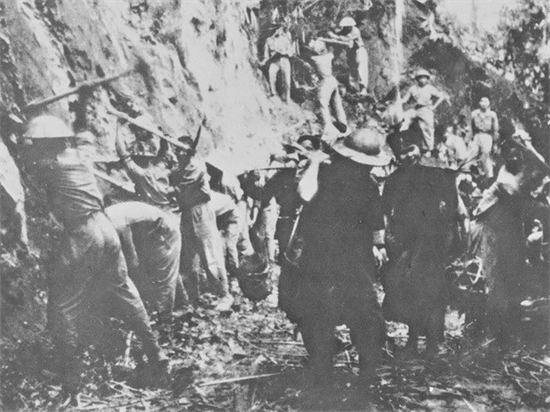The 1954 Dien Bien Phu Victory: A Lesson on Our Party and People’s Will and Determination
The Dien Bien Phu Victory in 1954 represents a glorious landmark in the history of building and defending the nation of our people, leaving a number of lessons of historical and epochal significance. Among these, the lesson on our Party and people’s will and determination to achieve independence is still valid.
First of all, it was the sound leadership, spirit and creative mind of our Party and President Ho Chi Minh, particularly of the Party Executive Committee and Headquarters of the Campaign that brought about this victory. At the first onset of the war of resistance against the French colonialists, our Party and President Ho Chi Minh set forth the resistance and military guideline of independence, self-reliance, soundness, and creativity. That guideline was the continuation of the national people’s democratic revolution by means of revolutionary war, which aimed at “national independence, land to the peasants, advance towards socialism.” That goal, which reflected soundly the heartfelt aspiration of the majority of toiling people under colonial and feudal oppression from generation to generation, served to motivate the spirit and determination to overcome all hardship and sacrifice of tens of thousands of officers, soldiers and conscripted labourers participating in the campaign. Our Party, with a strategic vision, was determined to strike exactly at the backbone of Navarre’s strategy. In order to realize that plan, we proactively launched a number of campaigns throughout Indochina theater of war, making the enemy disperse its forces and spread its mobile troops across the theater, creating a comparative advantage in terms of strength for us, compelling French troops to engage in a battle of strategic importance in Dien Bien Phu within our designated time and place. The Politburo and General Military Commission, with their determination to annihilate completely the enemy’s strongest entrenched fortifications in Indochina, appointed General Vo Nguyen Giap to act as General Commander of the Campaign. The early combat method of the Campaign was “speedy fighting, rapid winning”. After one month’s preparation, all units were deployed in combat formations, ready to open fire according to this combat plan. However, on realizing a number of drawbacks, the Party Executive Committee and Headquarters of the Campaign decided to shift from “speedy fighting, rapid winning” to “steady fighting, steady advancing”; postponed the attack time to make further preparations, to change combat formations and to reposition military units in accordance with new method. This change was the result of the independent, creative and decisive thinking process of our Party and President Ho Chi Minh, particularly of the Party Executive Committee and Headquarters of the Campaign, on the basis of a firm political spirit, as well as the cautiousness and dialectics on analyzing situations in the theatre of war, with a view to being sure of success and minimizing our losses. This was the decisive factor that ensured our army and people’s victory on Dien Bien Phu Front.
 |
|
Openning new road to Dien Bien Phu |
Dien Bien Phu victory illustrated the strength of the will and determination to “rather sacrifice all than lose independence and live in slavery” of our army and people. Armed with rudimentary weapons and the spirit of “making sacrifices for the birth of the Fatherland,” the entire people stood up to wage a war of resistance, brought into full play patriotism and revolutionary heroism, emulated to build firm rear, made contributions in terms of human and wealth, and ensured every necessary condition for the theater of war. “The communist army is well-armed and becomes more powerful because of its special structure of politics… that army works very hard according to joint efforts, which are broadly agreed by everyone. This example is worth thinking about,” said General Raoul Salan, then commander-in-chief of the French forces in Indochina.
Our army and people’s bravery in the field was the direct factor in Dien Bien Phu victory. Within more than one month, soldiers and pioneering youth, with their determination to fight, determination to win, and their intelligence, valiance and vehement belief in victory, completed a huge amount of work; dug hundreds of trench lines; and repaired 82km of the road connecting Tuan Giao and Dien Bien Phu, creating favourable conditions for deploying forces and towed artillery systems, especially heavy ones (105mm), to the battlefield safely and secretly. That was a big surprise for French forces. In terms of strength, although our army outnumbered the adversaries, they lacked experience in attacking fortified positions, and were equipped with less modern weapons. The campaign, meanwhile, lasted 55 days, and there were a lot of difficulties in logistics and technical support. Thus battles could not be fought constantly, but were divided into small waves of attacks. After each one, it was necessary to reorganize units, supplement logistics and technical support and other support items. Based on that creativeness, our artillery commanders also set up dummy artillery pieces for deception, causing about 80% of French forces’ bombs and ammunition to be dropped off target. Due to the skillful use of camouflage and deception, our soldiers protected successfully their valuable heavy artillery pieces and important military targets. During the campaign, many officers, troops and conscripted labourers fought valiantly and laid down their lives for this victory. This is why French forces suffered heavy losses in Dien Bien Phu.
Assoc. Prof. Dr. Pham Bang Luan
Institute for Military Art and Science, National Defense Academy